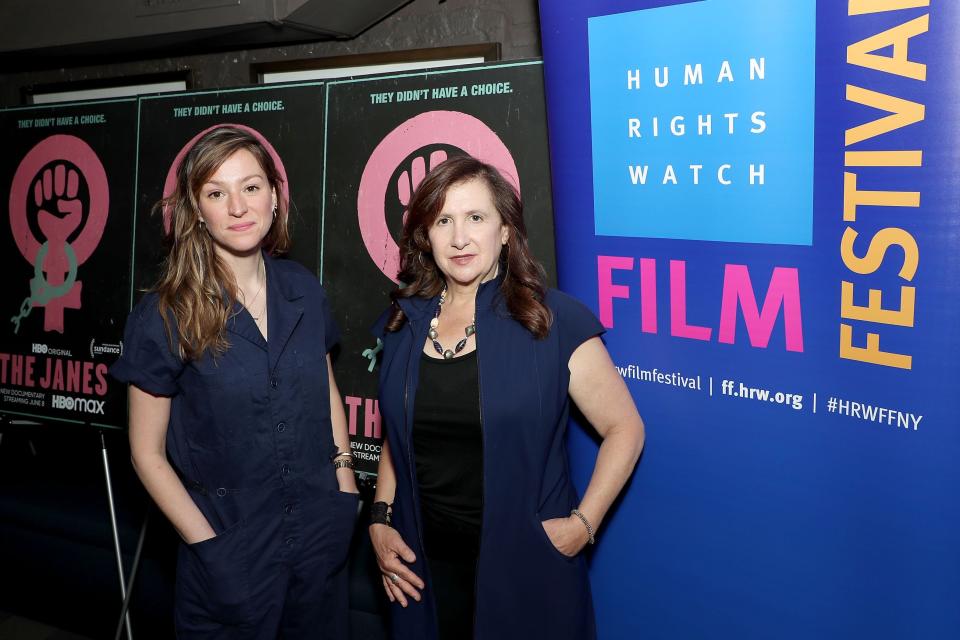Timely 'Janes' documentary spotlights group that provided abortions pre-Roe v. Wade
- Oops!Something went wrong.Please try again later.
"The Janes" documentary is both a rearview mirror and a crystal ball.
The HBO film, debuting Wednesday (9 EDT/PDT), celebrates the efforts of an underground, female-led organization that gave women in Chicago access to then-outlawed abortions, before the procedure became a constitutional right with 1973's Supreme Court Roe v. Wade decision. The previous year, the court sanctioned birth control for the unwed.
It was a grim time for women, who risked losing their jobs for being pregnant and couldn't get a mortgage on their own, says Emma Pildes, who directed the documentary with Tia Lessin.
"The limitations were far and wide and humiliating," Pildes says. "So battling to be a person at that time, in certain ways, was its own fight," complicated by the prospect of becoming pregnant and trying to figure out what to do. Your options were unscrupulous practitioners. Women were often sexually assaulted, physically harmed (or) died because of the people that were in charge."
Abortions don’t have to be traumatic. But overturning Roe v. Wade could make it that way.
Starbucks will pay for travel expenses for workers seeking abortions
Pildes has a personal connection to the film. Her father was married to Judith Arcana, a Jane member. Both are featured in the documentary.
"The Janes" opens with a woman, Dorie Barron, recalling her brutal abortion orchestrated by the Mafia, performed at a remote motel.
“I had no other options," she says. "I wanted it over with, and I didn’t care how it was done. I was that desperate.”
Barron remembers being "petrified" in the motel room, with another woman also seeking an abortion. "They spoke all of three sentences to me the entire time: ‘Where’s the money? Lie back and do as I tell you. Get in the bathroom.’ That was it.”
After their abortions, the women were left bleeding.
"If I had stayed in that room, I’d be dead.” Barron says.
'Crimes of the Future' finds 'spookily' timely horror in abortion rights, climate change parallels
Thousands gather for nationwide 'Bans Off Our Bodies' rallies for abortion rights

But abortions coordinated by the Janes were another story. The documentary says that, from 1968 to 1973, the group "provided an estimated 11,000 safe, affordable, illegal abortions."
Members would discreetly advertise a phone number. Callers were assigned a counselor and given an address. From that first location, they were driven by a member to another, where the procedure was performed. Some Jane members learned to do the abortions themselves.
"They really laid it on the line to do this," Pildes says of their disregard for legal consequences. After last month's leak of a Supreme Court draft overturning Roe v. Wade, Pildes says, "The women of Jane are mad as hell."
A clerk? A justice? Answers scarce on who leaked draft Supreme Court abortion opinion
Pelosi responds after archbishop denies her Holy Communion for supporting abortion rights

The potential decision also devastated Lessin, a longtime advocate of abortion rights, who says she was arrested in 1989 in front of the Supreme Court as justices weighed the case of Webster v. Reproductive Health Services. (It eventually ruled that a Missouri statute that barred state employees from performing abortions and banned it from government facilities was constitutional.)
"It wasn't surprising, but it was deeply disturbing and sobering," says Lessin, who says she declined opportunities to show the film overseas in order to focus on promoting the film in America.
"The laws that are being considered and passed in states in the last few months are actually much more harsh, much more punitive, much more restrictive than any laws that were on the books before Roe," says Lessin, including a Texas law that allows private individuals to sue abortion providers or people who aid and abet an abortion in violation of the law. Successful litigants can collect at least $10,000. "In Ohio, the legislature is considering a bill that doesn't make any exceptions for rape or incest."
While technological advances like the internet and cellphones give women more access to birth control and the abortion pill, Lessin says those very advancements could help a prosecutor build a case: "Because phone companies could turn over data that help prosecutors geolocate who's been near an abortion clinic in the state of California (who) actually live in Texas, and who's been searching for the abortion pill on their computer."
Lessin hopes the film will motivate viewers to fight for legal abortion.
"There's a lot of folks working in the spirit of the Janes, and we hope that this film invigorates that and also helps engage people, the vast majority of this country who believe in a woman's right to choose," she says. According to a Gallup poll released last week, 58% of Americans oppose annulling Roe v. Wade.
"We just need those folks who think that way to... engage in this movement in any way that they can," Lessin says.
Volunteer pilots, access groups prepare to transport people for abortions if Roe is overturned
Mormon mom of six writes viral Twitter thread focusing on male responsibility in pregnancy
Contributing: Madlin Mekelburg, Austin American-Statesman
This article originally appeared on USA TODAY: HBO's The Janes spotlights org that provided abortions pre-Roe v. Wade

